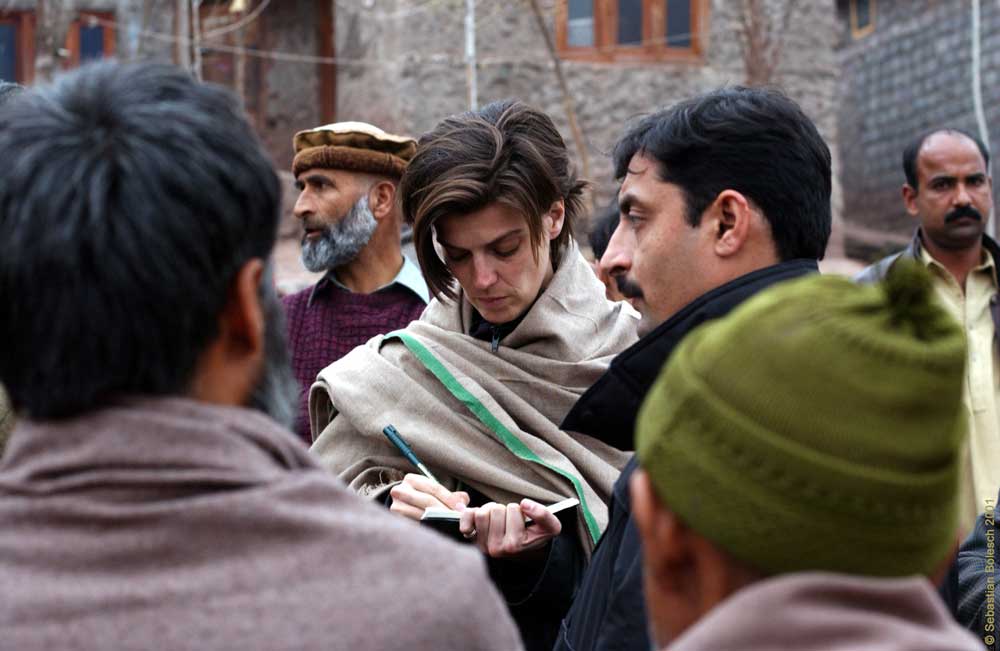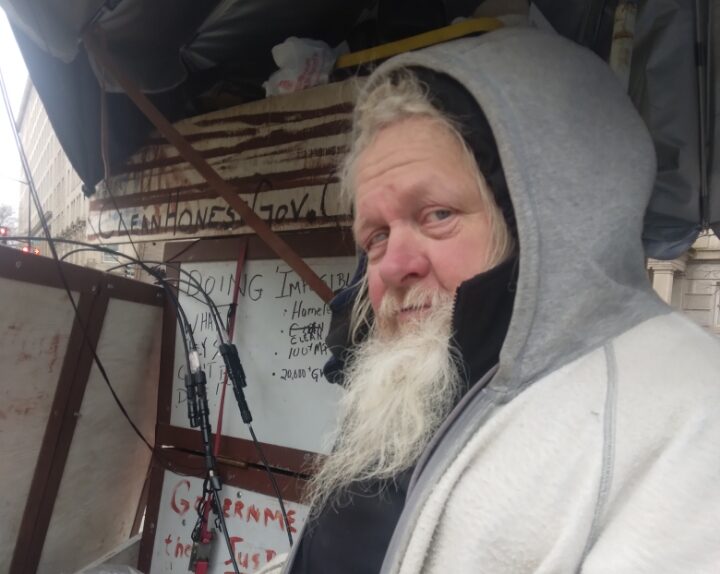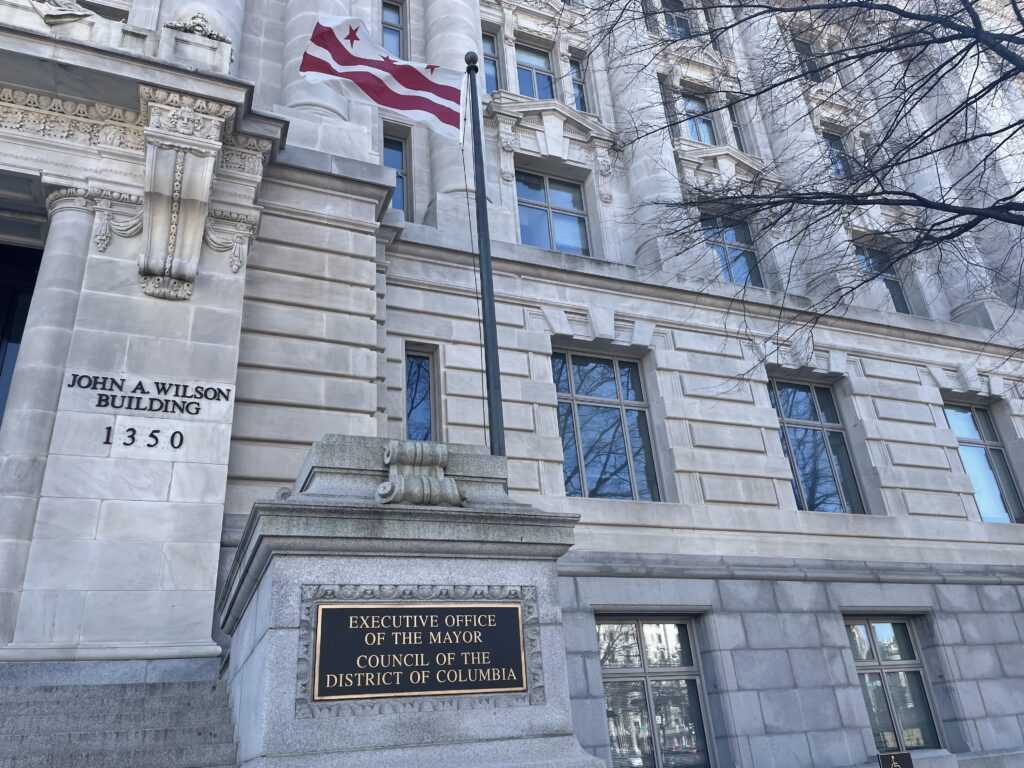Carolin Emcke is a publicist and philosopher who thinks that the basic principles of co-existence are in danger. In an interview with Surprise, she talks about the significance of public spirit, her fears for modern citizens and the importance of acknowledging the freedom of others. She recently gave the following interview to our sister paper in Basel, Switzerland.
You wrote recently about community spirit in your column for one of the largest daily newspapers in Germany. What exactly do you mean by the term ‘community spirit’?
Community spirit [is a term that] I take to mean the knowledge that, as society, we are concerned with discovering, encouraging and protecting the things that are of interest to us all. Community spirit depends on the concept that beyond the radical differences of each and every individual and the particular interests of groups, there is also something that is universal. As an individual, I can belong to a different “we” – I can define and articulate myself by my social class, faith and sexual orientation. But in a pluralist society it is also necessary to relate to things that are common to everyone – such as what public property we have in common, what is in everyone’s public interest. It also must be thought and spoken of as a “we”: something that appeals to everyone.
You write that this type of community is fading and may well vanish. Today, debates [about this issue] are constantly taking place everywhere.
OK. The fact that these matters are being debated does not mean that the debate is really with and for each other. Many of the public, media-run debates are really stage-managed pseudo-debates. They present conflicts and glorify various antagonisms, without taking into account the social, political or cultural phenomena that should be dealt with. This type of debate always suggests that common thought is not possible, that there is not the strength nor the willingness to simply discuss a problem.
How do you identify this threat to society?
I worry that the Res publica is disappearing. [By using the term Res publica] I mean two things: Firstly, things like public spaces, public property such as public libraries, swimming pools or even park benches are actually vanishing. And secondly, community spirit disappears, in terms of it being something that can be used for political appeal. So, what also gets lost are good reasons as to why paying more tax could be in the political or democratic interest, why it can be useful to defend the rights of others and even to defend liberties that are not even important to you.

What are the good reasons to pay more taxes and defend the liberties of others?
Well, a society that is just about my own freedoms would be no community at all. On the other hand, a society that allows the free development of everyone also protects me. If I am serious about religious freedom or human dignity, I must also celebrate and defend this where it does not affect my own religion or dignity. Such a society is not only freer but also more liveable, as it is richer, more creative and diverse.
It is the same thing with willingness to pay more taxes: everyone benefits from a community with a good infrastructure, excellent schools for all, high-quality health care, an active public cultural landscape. Look at the United States: What makes American democracy sick is not just their authoritarian, autocratic president, nor a dysfunctional Congress, but a lack of infrastructure, of community and of the Res publica. In any case, I believe that it is worthwhile investing more taxes in education and infrastructure.
One phrase that is common to politicians of all persuasions is “We have to take the concerns of our citizens seriously.” What do you say to that?I can’t listen to that sentence anymore because on its own it says very little! In a democracy, it is of course important to respect that people can articulate their discomfort, or even pain. Of course, it is also important that social experiences, with regard to exclusion or disregard, poverty or helplessness, can also be expressed. And it is, of course, important to respond to these experiences. But not every feeling is worth being taken seriously in politics. Firstly, because, at the moment, feelings are very volatile. They are also very transitory. Sometimes the only things being articulated are hatred, racism and the obscene joy of belittling others. Concern is now a term that has a rhetorical calculation. Concern is happily disguised by things that have little to do with being concerned, but instead move between paranoia and outright hatred. In this sense, a calm and balanced view is always required: what is being articulated, is it a reasonable concern, what is it about, is there an empirical basis for it? – and then answers must be given.
If I understand you rightly, you are saying that, in this age of Fake News, we no longer have any accepted empirical basis.
Just because there are lies, is there no more truth? If that was the case, you would not know what a lie or the truth is. There are, of course, still empirically verifiable and plausible facts. You can prove climate change using data collected over decades which is comparable, has been methodologically proven and verified. This is denied. And then you take a look at the counter arguments. No matter how big the propaganda machine of a particular warring party, they can still seek and find proof, forensic evidence, documents and audio material in order to reconstruct a war crime. Naturally, there are sometimes gaps, limits to knowledge; sometimes there are a multitude of clues, approximations of the truth, which are accepted with reservations, until more detailed descriptions can be uncovered. But just because there are conspiracy theories, superstitions and lies, it does not mean the end of the world, just as the possibility to distinguish what is true from what is false or made up will remain.
Is a perceived grievance always a grievance?
A perceived grievance is a perceived grievance. Nothing more. First of all, it is a subjective impression – a hypothesis – and its validity can be compared and checked.
Do we have a satisfactory approach to perceived grievances in our societies?
What does “perceived” mean? And whose matters are you referring to? You can only link this to something precise. General and vague criticism of politics cannot be debated fairly or in a differentiated manner. I have the impression that there are a number of serious social and economic grievances for which either nobody feels responsible, or which are perceived to be too complex or uncomfortable, and so they are not dealt with. For example, the lack of social mobility in our society; that is, the fact that social origin still plays a vital role in opportunities for advancement. This is unacceptable.

You have spoken about hatred being disguised as concern. What can be done about this?Certainly nothing that uses hatred and aggression. And definitely not by demonising people. It is always about connecting criticism only to actions. That is, what someone says or does, but not to denigrate the person themselves. When hatred is combined with violence, when hatred is organized into networks of fanatics or movements, then investigating authorities and the judiciary must respond. But this hatred, which can be seen in everyday life in the stigmatisation of people who have different views or a different outlook or sexual preference, most be countered.
Returning to community spirit: how do we get away from the struggle for interpretational sovereignty in favour of a common construction of reality?
That is a very important question, to which I do not have a good answer. At the moment, it really does look as though public debate is becoming ever more aggressive and perceptions are drifting apart more and more. Anti-science, the ideological movements that attack the enlightenment and reason, the possibility of propaganda being used to spread superstition and conspiracy theories via social media, this all makes it more difficult to understand the meaning of a common world view. It definitely requires effort to be made at a variety of levels: at the level of genuinely propagandistic manipulation of Information or entire systems, international responses are required; on the social media level, the pressure on monopolies such as Facebook must be greater, so that they are held more accountable for hatred and false reporting; the enormous importance of journalism therefore becomes clear. It is a real and proper task to research what can be proven and what cannot, what is and is not a lie, what has happened and what is merely reported to have happened. It requires craftsmanship and ethical standards to do such work – and in recent years we have really seen what happens when propaganda, lies and false reporting are spread unfiltered and unchallenged, and how they can influence people.
When asked what it means to be a society of immigrants, you speak of a pluralisation of perspective. How do you feel about those who see this as a casualty or a danger?
Well, I cannot imagine anywhere in today’s world, regardless of the country, town or family, in which different perspectives do not already exist! Each and every one of us is already living in an environment where there are social or cultural differences. Nobody grows up in a totally homogeneous environment. The older people in Germany, who have already fled, they know this. As do the miners, who have lived through the greatest variety of historical upheavals. As do those in agriculture, who use seasonal workers to gather their crops, or who previously moved to and fro themselves. As do all those who go to the Synagogue on Fridays or to church on Sundays: they know the diversity of the people who pray there. Diversity has always been a constant in our society; it can be either urban or rural. But it is a genuine experience for everyone. The bottom line is that the state must guarantee that everyone can have individual relationships, preferences and beliefs. Each person’s specific faith and how they want to live and love, should be guaranteed. As long as my individuality is protected, as long as the different nature of my neighbour is just that – something different.
LGBTQ community, the poor and migrant women are all harassed from time to time because they are different. Are these minorities in the same boat?
As minorities, they are all ever more vulnerable. But of course, exclusion takes many forms. Recently there have been attempts to play these groups off against each other. It has been suggested that, on one side, there are the social questions of poverty and social inequality and, over there, is the political issue of the recognition of migrants, gay and lesbian people and others. That is politically fatal: both questions must be considered together. Social and political inequality. The exclusion of gay or black people is not just a political, but also a social question. Poverty is never purely a social issue but is also always one related to political stigmatisation and a lack of representation.

Translated from German by Edward Alaszewski. Republished courtesy of the International Network of Street Papers news service.







